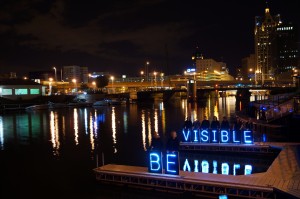Even though I am not an arts administrator, I have had to wear small versions of that hat in my career as a professional musician. In my past life as a member of a string quartet that was a non-profit, my colleagues and I were responsible for many aspects of the business, from planning tours to working with our board, to fundraising and everything in between.
That kind of work made me realize that there were many gaps in my training to be a professional. Yes, I received excellent training to help me be the best musician I could be, but as far as navigating the waters of the arts world, I really didn’t have much guidance. So, here are some ideas for any stage of an arts career:
- Know that you will need a variety of skills to succeed, from understanding fundraising, to writing grants, to speaking on behalf of your organization, to programming, collaborating and just about everything you can think of. Be bold. Find out more about areas that interest you or that you want to improve.
- Network, network, and network again! Yes, we are very busy, but try to attend a new event whenever possible. One never knows where a connection can lead.
- If you know that arts administration is where you want to be, invest in a degree or certificate program. Attend conferences and workshops. Be visible.
- Have a short and long term plan, but remember to be flexible!
- Know that the arts will always need great leaders and strive to be the best leader you can be.

Click on the Twitter logo to share this post. Start a conversation.


Your last two points have proved invaluable for me in transitioning from acting into arts administration, Margaret:
* Have a short and long term plan, but remember to be flexible!
* Know that the arts will always need great leaders and strive to be the best leader you can be.
Having moved around quite a bit in my 40+ years as an arts administrator, I’ve learned that, while there are wonderful mentors available, and a vast number of successful models for what is respectfully known as “creative placemaking”, networking and community engagement are key to making your career, and the arts in general, indispensable.
THE ARTS MATTER and are essential to the proper functioning of our society and continue to demonstrate their ability to provide categorical evidence of their impact on social issues that concern virtually every facet of American society, especially for our children.
We all need to guarantee that arts-friendly public policies are adopted at the federal, state, and local levels or arts funding and arts education once and for all — and cannot be rescinded!!!
Elected officials in our cities, large and small, need to be held accountable by local citizens to develop a cultural roadmap for their municipalities, and to drive collaborative partnerships that will ensure that the arts and culture are included in strategic planning now and in perpetuity!
As Maureen Dezell wrote in The ARTery two years ago, “In 2002, the late Mayor Thomas Menino did one of the things he’s known to do best: called, convened, pushed, prodded, rewarded and froze out the right people at the right time, keeping all interested parties at the table until a deal to bring the Opera House back to its original splendor was done that fall. The city put zoning and building permits and other approvals on a fast track and the theater reopened with a touring production of ‘The Lion King’ in July 2004.” http://artery.wbur.org/2015/10/15/huntington-colonial-shubert
We need more citizens that are committed to providing the tools to help students succeed as musicians, entrepreneurs and arts administrators. Thanks for all that you do both onstage and off!